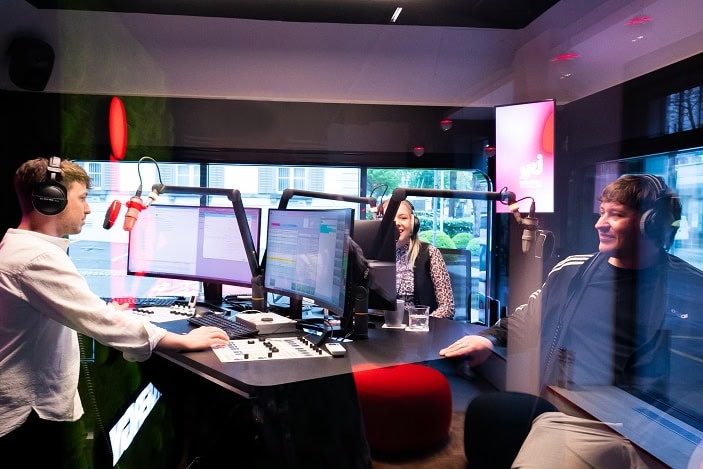Swiss media launch the YouNews youth media days
Young people make media: this is the motto under which SRF, Tages-Anzeiger, SonntagsZeitung, BZ Berner Zeitung, Watson, the Swiss News Agency, Radio Argovia and the Swiss School of Journalism MAZ are jointly launching the Swiss Youth Media Days YouNews.

In the week from January 15 to 21, 2018, various Swiss media will offer young people the opportunity to get to know journalistic work during the first YouNews - Swiss Youth Media Days. The aim is for young people to experience and understand how traditional media contribute to opinion-forming in our democracy in times of fake news, chatbots and insta-stories. The young people can work directly in the editorial offices on various projects, hand in hand with the professionals. The resulting stories, radio reports or TV videos are published in the respective host medium.
The Youth Media Days project was initiated by Viviane Manz, editor and producer at SRF Tagesschau and Michael Marti, Head of Digital and Newsnet and member of the editorial board of Tages-Anzeiger/SonntagsZeitung as well as Franz Fischlin, SRF Tagesschau, Media Club and representative of the "Quality in Journalism" association, which supports the project.
"A high level of media literacy among young people is more important today than ever, and this is where YouNews comes in," says Michael Marti. He adds: "The aim of the Media Days is not just for pupils to acquire new knowledge, we media professionals are also keen to get to know and understand young people's media consumption better."
"We are really looking forward to meeting the young people. And we are convinced that we can learn as much from them as they can from us," say Viviane Manz and Franz Fischlin.
Together with @tagesanzeiger, @watson_news & partners we invite young people: Make media with us! #YouNews2018 ? https://t.co/MwWUTL8JEL pic.twitter.com/dmoVUhhRCJ
- SRF (@SRF) October 4, 2017
The participants and their projects
BZ Bernese Newspaper
Young people are going stupid because they only stare at their smartphones. This is a frequently heard statement from the older generation of newspaper readers. But is it true? In the BZ Berner Zeitung workshop, young people reflect on how they use social (Snapchat, Instagram) and other media. They process their findings, supervised by professionals, in their own video or text contributions and see how much effort it takes to produce publishable, serious media contributions.
MAZ
The MAZ - The Swiss School of Journalism - is an institution supported and recognized by the media industry for the training and further education of media professionals of all kinds, where professionals from the field teach and train. The MAZ in Lucerne offers students insights into the craft of journalism, its basic rules and interesting examples from training.
Radio Argovia
How is news made? How do I make a radio report? What does it take to make a radio program? Radio Argovia offers a look behind the microphone. Together with radio professionals, pupils produce their own news program, write moderations and present them at the microphone.
Radio SRF 3
At Radio SRF 3, the students are part of the editorial team from the planning meeting to the broadcast review and work on the daily program. The "Büsser am Mittag" program is designed together with the producer and the presenter and questions for the lunchtime quiz are researched. At the end, the pupils are allowed to act as referees on air.
Radio SRF Virus
How is a radio program created? How is the music put together? What are the tasks of a radio presenter? What does he/she do while the songs are playing? Pupils find answers to these questions as co-presenters on Radio SRF Virus, where they actively help to create a program and also prepare the news for the online channel.
Swiss News Agency SDA
At the SDA, pupils learn which criteria are used to select news items, how news is structured, how facts are verified and what role social media plays. They are then allowed to film a current topic with their smartphone and receive an introduction to editing techniques from a video professional.
SRF (young target groups)
How does SRF find suitable protagonists for its SRF video formats for young target groups? How does the editorial team find out whether their statements and stories are true? How are fake views and fake likes or fake profiles on social media channels recognized? The creators explain their work. Afterwards, the participants do their own research in groups.
SRF daytime news
Tagesschau invites two classes to visit SRF television. The classes get to know the day-to-day workings of the editorial office at close quarters and take a guided tour of SRF. Three pupils from these two classes then work together with an editor and a cameraman to produce a television report.
Tages-Anzeiger / SonntagsZeitung
At Tages-Anzeiger/SonntagsZeitung, a class has the opportunity to spend two days getting to know the editorial team. In addition to visiting the editorial office and the newsroom, pupils can work with experienced VJs to launch a video project on the topic of young people's media consumption, in which they themselves will work in front of and behind the camera.
Watson
One morning, the Watson editor-in-chief explains the editorial team to the participating students and how the media's traditional information mandate must be fulfilled in the digital age. The students then propose their own stories. The best project will be developed and published under the guidance of the editorial team.
Zambo
Zambo offers a reporter course that explains how to conduct an exciting interview, how in-depth research works and how it should be ideally prepared for radio. Afterwards, the students see how a Zambo program is created and they take part in the discussion to determine the topic.








